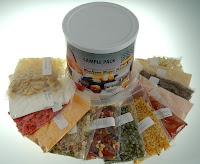 Whether you find yourself in a short-term emergency such as a three-day power outage or camping trip or a long-term disaster like a post-earthquake scenario, obtaining food from all available sources can come to mind. If you have enough water sources and a reliable shelter, food is the next consideration, since a healthy human can only last three weeks without it. However, you wouldn’t want to wait that long before you’d start looking. If you are well-prepared for a disaster, you should have stocked survival food somewhere. If not, then you should look for food sources outside your own kitchen.
Whether you find yourself in a short-term emergency such as a three-day power outage or camping trip or a long-term disaster like a post-earthquake scenario, obtaining food from all available sources can come to mind. If you have enough water sources and a reliable shelter, food is the next consideration, since a healthy human can only last three weeks without it. However, you wouldn’t want to wait that long before you’d start looking. If you are well-prepared for a disaster, you should have stocked survival food somewhere. If not, then you should look for food sources outside your own kitchen.
Ideal foods for survival often have a long shelf-life, lightweight, easy to prepare and have nutritional content. Knowledge about edible foods, fishing and hunting animals will also be handy should supplies of pre-packaged food run out. Meeting all these requirements will increase a person’s likeliness to survive even if he is in the middle of a disaster or the wilderness.
Long shelf-life means the food is non-perishable or does not easily spoil. Good examples of these are protein bars, crackers and canned goods. If you store these foods in your survival kit, you should update every few months because they still have an expiration date. Preserved foods such as hot dogs will last longer in cold climates too.
Your survival food should also be easy to prepare. Pre-packed ramen, pasta and potato soups can be bought at your local supermarkets. They only require boiling water and occasional stirring. Most campers believe that an ideal survival food should only take 20 minutes at most to cook.
If you are backpacking in the wilderness, lightweight survival food should come into picture. Since you are carrying a lot of gear, your food should only minimally add to the weight. There are freeze-dried foods and packaged ready to eat tuna which they can indulge into time and again.
Lastly, being in a disaster or out in the wilderness require you to be alert and almost always be on your feet. Expending energy and calorie-burning becomes as a continuous process. The food you eat should have a nutritional value enough to provide your required energy.
If you’re about to run out of food supply, you will be prompted to look for food from your immediate surroundings. Trapping animals would be better than hunting since you wouldn’t have to expend a lot of energy. If you’re near a body of water, you can always look for some fish. You can also eat a fresh fish raw or cook it over fire. Furthermore, there should be an abundance of fruits and vegetables in the wild. Learn how to identify edible berries and nuts. If you’re on an island, coconuts will also give you something to eat and drink.
All of us agree that food is an essential element in order to live. Packing up your own survival food is a good practice even if you don’t need it today. In the face of dire need and emergency or even when you’re outdoors for a recreation, arming yourself with the right knowledge about survival food will increase your chances of being alive until help reaches you.
